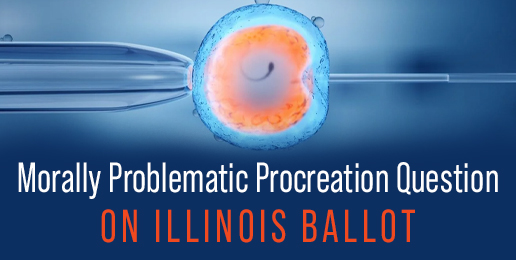
Written by Rev. Mark Eddy
Thanks to Illinois Family Action for distributing an article by Fran Eaton concerning the three upcoming Illinois Ballot Initiatives. I would like to add a few more biblical ideas to consider before voting on this particular ballot questions, which states:
“Should all medically appropriate assisted reproductive treatments, including, but not limited to, in vitro fertilization, be covered by any health insurance plan in Illinois that provides coverage for pregnancy benefits, without limitation on the number of treatments?”
In addition to putting insurance companies (and their ratepayers) on the hook for unlimited in-vitro fertilization “treatments,” the wording of the first ballot initiative is a trojan horse for abortion support.
Remember that those who call abortion a “right” consider it a “medically appropriate assisted reproductive treatment.” For them, “reproduction” includes the killing of babies so the mother does not reproduce.
Initiative #1 specifically mentions only IVF. The goal of the IVF procedure seems to be “pro-life:” the creation of a human life. But Fran Eaton’s article correctly revealed how this procedure usually involves the destruction of unwanted embryos. This reminds me of the pro-abortion slogan:
“Every child a wanted child.”
What makes a child human is not whether he or she is wanted. If it were, then the old Roman practice of exposure would be legal today. If a child is not wanted, why not let it die?
We have good reasons to oppose IVF, not only due to the destruction of human embryos or conception taking place outside of a mother’s body but also because God commanded,
“You shall not covet …” (Exodus 20:17).
A desire to have a child through means other than those which God designed can be an expression of covetousness. Non-Christians might not be concerned about coveting. Even St. Paul said,
“I would not have known covetousness unless the law had said, ‘You shall not covet’” (Romans 7:7).
But since “there is no authority except from God, and the authorities that exist are appointed by God” (Romans 13:1), no government has authority to promote anything contrary to God’s will.
The Bible records God’s will for procreation: “God created mankind in His image … male and female” (Genesis 1:27) with the blessing/command “be fruitful and multiply” (Genesis 1:28).
Moses explained that God’s uniting of Adam and Eve was His institution of marriage: “Therefore a man will leave his father and his mother and cling to his wife, and they will become one flesh” (Genesis 2:24).
Jesus affirmed marriage as the place for procreation when He cited the creation account by saying, “‘the two will become one flesh.’ … So, what God joined together let no man separate” (Matthew 19:6-7). God joins a man and a woman in marriage, and God’s creation mandate enables the one-flesh union of a husband’s sperm and his wife’s egg in the procreation of a child.
What could be wrong with a procedure that produces a baby for a couple that wants it?
Or, if God allows a baby to be conceived by IVF, how could the means be wrong? Think of Abraham and Sarah. They were involuntarily childless for decades. Sarah suggested,
“the LORD restrained me from bearing. Please go in to my maid-servant [Hagar]; perhaps I shall obtain children by her” (Genesis 16:1-2).
All three consented.
Hagar conceived and bore Abraham’s son Ishmael. The rest of Genesis 16 records numerous problems which resulted from this.
Thirteen years later, God explained His previous promise, telling Abraham about Sarah,
“I shall also give you a son from her; and I shall bless her, and she will become nations” (Genesis 17:16).
Abraham expressed disbelief that he at 100 years old and Sarah at 90 could give birth (17:17) and stated His wish that Ishmael would be the promised “seed.” Still, God named Sarah’s son Isaac as the one whom God had intended (17:18-19).
God listened to Abraham’s request and blessed Ishmael also. But in the next chapter, God reasserted His will, saying: “Sarah your wife will have a son. … Is anything too wonderful for the LORD?” (Genesis 18:9-14).
Isaac’s and Ishmael’s descendants have been engaged in conflict of various sorts ever since.
A child obviously can be conceived in ways contrary to God’s will. But if people today can see problems with inserting a maid-servant in Abraham and Sarah’s “reproductive treatment,” can they not see the problem of including medical staff intervening in the acts necessary to conceive a child?
Instead of letting our desire for children push us beyond the parameters ordained by God, “godliness with contentment is great gain” (1 Timothy 6:6).
Remember the patriarch Jacob.
He married Rachel and her sister Leah (their father’s deceit, which led to this situation, is another issue). Rachel remained childless, while Leah quickly had children. When Rachel demanded of Jacob, “Give me children!” He answered, “Am I in the place of God, who has withheld from you the fruit of the womb?” (Genesis 30:2).
A physician is not in the place of God either. No one is.
In God’s good time, Rachel conceived in the God-intended way.
All this is to say that Christians can be “pro-life” but not favor “conception at all costs.” Instead of paying for everyone’s reproductive desires, it is better to learn to be content with the blessings God has given. Governments should not enshrine in law procedures contrary to God’s revealed will.
In response to God’s command, “Love your neighbor as yourself” (Leviticus 19:18; Matthew 22:39), and “Love the Lord your God with all your heart …” (Deuteronomy 6:5; Matthew 22:37), we should demonstrate compassion for couples that are dealing with the disappointment of childlessness, not enable morally questionable treatments.
My father’s Uncle Hilmer and Aunt Frieda could not have children, so the extended family included them in many family activities. That helped fill the void of their childlessness.
Just because something is now technologically possible does not make it good.
Contrary also to former president Trump, it makes no sense to pay the exorbitant price for IVF when continuing to try to have a child the natural (God-given) way would be more cost-effective (financially and emotionally).
We need to learn, as St. Paul did, “in whatever state I am to be content” (Philippiams 4:11), even if that state is Illinois.
Mark Eddy is the Senior Pastor of Zion Lutheran Church in Taylor Ridge, Illinois.






















